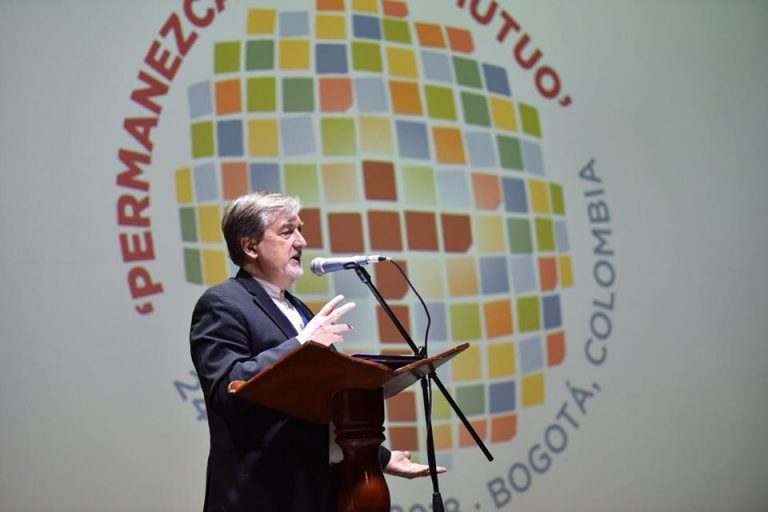
The Global Christian Forum, which connects the broadest range of global Christianity, held its third Global Gathering in Bogotá, Colombia from 23-27 April, under the theme ‘Let mutual love continue’(Heb 13:1). It brought together the widest variety of Christian traditions, with 251 church leaders from nearly every stream of global Christianity and 55 nations.
Against the backdrop of growing division in the world, the ‘meeting itself became a message’ of careful listening and respectful engagement across barriers of old enmities and historic separations.
In recognition of the churches of the host nation, the Message said participants “have listened to, and been inspired by, witnesses working for peace. We pray that the peace process may continue in Colombia and bring hope and reconciliation to those who are suffering and struggling.”
Participation in the Global Gathering included delegations from the Catholic Church (Pontifical Council for Promoting Christian Unity), the Pentecostal World Fellowship, the World Council of Churches, and the World Evangelical Alliance together with those of many other Christian World Communions and international Christian organisations.
Secretary of the GCF, Revd Dr Larry Miller, said participants repeatedly affirmed the Forum as an indispensable instrument for promoting Christian unity and engaging in conversation on the challenges Christian communities worldwide face today.
“The existence of the GCF as a place where churches and church leaders who are often strangers to each other to come together in ‘mutual love’ is a realisation of the shared yearning for healing in the wounded body of Christ.”
At the close of the Global Gathering, leaders of confessional bodies commented on the role and value of the GCF within the wide world of global church relationships.
Bishop Brian Farrell, Secretary of the Pontifical Council for Promoting Christian Unity, said, “This gathering is the third in a series. It has been a moment of tremendously improved relationships between all the participants, which reflects a new era of collaboration among the churches.
“I think the Global Christian Forum has shown that we do have a way forward, which is that we must not use our differences to stay apart and refuse collaboration. We need to see them as a certain contribution of richness to the whole Christian mission in the world,” Farrell said.
Pentecostal World Fellowship Vice Chairman, Revd Dr David Wells said, “As a result of the Pentecostal World Fellowship’s ongoing privilege of being at the table of the Global Christian Forum, deeper bonds of respect and love continue to develop with fellow Christians from other communions.
“The Bogotá Gathering reinforced the PWF’s continuing commitment to participate in the Forum in a fully engaged manner while recognizing the hard work yet to be done.”
World Council of Churches Deputy General Secretary, Father Dr Ioan Sauca, said, “Through prayer and sharing, the Spirit has led us, during this global gathering, to greater mutual love and to the experience of a real though imperfect communion in Christ despite and beyond our persisting ecclesial divisions and estrangements. This means that the Global Christian Forum is fulfilling its original calling.
“But the GCF will not have accomplished its mission unless we leave this global gathering firmly committed to encourage the churches we represent to walk together towards greater mutual love, mutual support and engagement in the struggles for reconciliation and just peace, starting in Colombia, extending through Latin America, and to the end of the earth.
“Only in this way will the churches we represent be able to address what prevents us from fully manifesting the One Church that anticipates the one reign of justice and peace.”
According to World Evangelical Alliance Associate General Secretary, Dr Thomas Schirrmacher, “Bogota was the Global Christian Forum at its best! To hear in small groups the personal faith stories of high-ranking Christians from all confessions — a mark of the GCF — was moving and eye-opening.
“At the same time, plenary presentations by the major expressions of Christianity on the future of ecumenical relations proved how much more friendly our relationships have become. We have matured to the point where we are more eager than ever to overcome major differences, yet without compromising our identities and Biblical convictions.”
“If the GCF did not exist, we would have to invent it today! Bogotá also proved that it was the right decision of the World Evangelical Alliance to endorse the future of the GCF when last year we reviewed its 20 year history, Schirrmacher said.
Source: WCC.